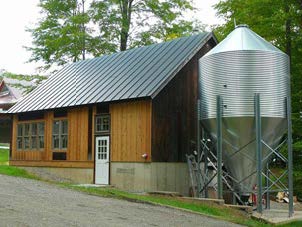Policy Brief: Renewable Energy
Author:Vermont Woodlands Board | | Date:February 16, 2018Public Policy Issue Brief: Renewable Wood Energy from Vermont Forests
Background:
Private forests have great potential to contribute to the next generation of Vermont energy use, through the increased utilization of wood as a component of a renewable energy portfolio. Vermont has a long tradition of burning wood for heat in the form of firewood. With ever more efficient, clean burning wood stoves and wood furnaces, firewood should continue to be an important heating fuel for residential use. Low-quality wood that was once processed into pulp to manufacture paper or cardboard, can now be processed into wood pellets, that provide a clean and convenient alternative to firewood. Wood chips (the chipped trunks of firewood-quality trees) are currently used in specialized boilers to heat schools, and other large public and private building complexes. VWA strongly supports expansion of the efficient use of wood to generate heat for residential, municipal and commercial use in Vermont. VWA advocates support for, and retention of, our current whole-tree chip markets, as well as the maintenance and development of a diversity of markets for all wood products. If grown and harvested in accordance with the Vermont Acceptable Management Practices for Protecting Water Quality on Logging Jobs in Vermont and burned efficiently, wood can be a renewable, carbon beneficial, energy source that will be essential to achieving the Vermont’s Comprehensive Energy Plan goal of obtaining 90% of our total energy from renewable sources by 2050.
Renewable energy policies should encourage sustainable forest management, recognize that energy produced from wood can be carbon-neutral, and provide the foundation of a sustainable wood energy market. Generating renewable energy from sustainably managed private forests means forest owners will have additional markets and revenue streams, to enable sustainable forest management and help keep their forests as forests. Additional markets for low-quality wood, as heating fuel, would help to support healthy rural economies and forest landscapes, by maintaining healthy forests, protecting clean water, reducing greenhouse gas emissions, and improving wildlife habitat. In addition, the harvest of low-quality wood for heating fuel, would provide additional growing space to produce high-quality, high-value forest products such as sawlogs and veneer. Renewable energy policies should strive to maximize the efficient use of wood products, in order to reduce carbon emissions and conserve our valuable ecological resources.
Vermont Woodlands Association Policy:
Vermont Woodlands Association supports expanded markets for sustainably produced wood fuel from private forests. Wood harvested in accordance with accepted silvicultural practices, from private forests and used in the efficient production of heat energy will contribute to our local rural economy, and to our energy security. Policies that encourage renewable wood energy production from forests must consider both the short and long‐term impacts of renewable wood energy markets on forest resources and carbon emissions, and avoid incentives that lead to unsustainable forest management practices.
Public Policy Goals:
The Vermont Woodlands Association, working with its partners and existing networks, will advance policy initiatives that:
- Develop and improve markets for sustainably produced, and responsibly harvested, wood for use as a source of heat energy.
- Promote forest sustainability in renewable energy incentives, procurement policies, and regulations, with incentives for third-party, independent forest certification, including the internationally recognized and credible American Tree Farm System certification
- Include mechanisms to safeguard against possible negative impacts of wood fuel production on forest health, forest productivity, water and wildlife.
- Create renewable energy incentives that work to supplement, rather than replace existing markets and work to establish new wood markets, where appropriate.
- Recognize that energy generated in an efficient manner from sustainably produced wood fuel, such as advanced wood heating, can be carbon neutral and that accounting for carbon emissions should be done at appropriate scale and in a timely manner, so that wood fuel projects can meaningfully contribute to renewable energy production.
- Support education programs that encourage understanding of renewable energy alternatives, including efficient use of wood fuel to generate heat energy.
- Support policies that increase the adoption of advanced wood heating systems that (a) utilize highly efficient combustion technology, (b) produce low levels of emissions, (3) support healthy forest ecosystems, and (4) consume local wood and contribute positively to local economies.
Policy Approval:
VWA is a non-profit (501(c)(3)) association dedicated to the health and enhancement of the working forest in Vermont. Through education, outreach, and advocacy we are a Voice for Healthy Forests in the Green Mountain State. Renewable Energy Resources from Vermont Forests was approved by the VWA Board of Directors on February 16, 2018
Vermont Legislative Recommendations:
- VWA endorses any legislation that furthers the Renewable Energy Vermont 2017 Five Year Action Plan for Increasing Advance Wood Heating in Vermont.
- VWA endorses legislation that mandates all state, municipal and educational facility fossil fuel heating systems scheduled for significant repairs (repairs to the “prime mover” or boiler equal to 30% or more of the cost of a new unit) or replacement to be replaced with advanced wood heat systems if physically practical.
- VWA endorses legislation establishing a state grant program to assist the above facilities owners in study costs for the conversion from fossil fuels to wood heat.
- VWA endorses legislation that would offer a sales tax exemption for advanced wood heat boilers.



